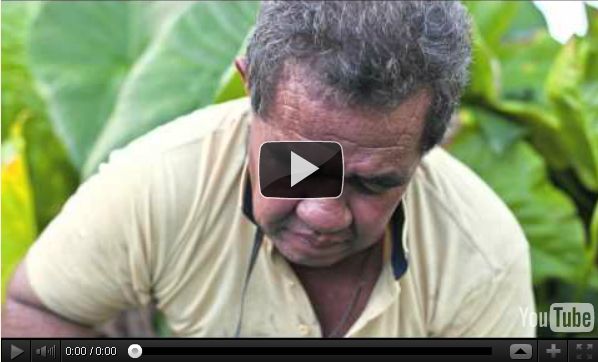Midway between Australia and Hawaii, rising sea levels and more frequent king tides on the small Pacific Island nation of Tuvalu are causing coastal erosion and salinating the groundwater, making it hard for Islanders to grow their traditional subsistence root crop, pulaka.
Niu Loane, a 52 year-old retired Tuvaluan man, spends many hours each day working in his pulaka garden bed in order to provide food for his family.
“I’m using all my time to make sure I can get something out of my (pulaka) bed. Traditionally, not only men work in the pulaka bed, but women from the family join them. People with plots like mine are working for similar reasons. To put food on the family table.”
In recent years, monthly high tides have risen considerably, forcing people like Niu and his family to find new ways to protect their crops from salt water intrusion. When the highest point of Tuvalu is less than 4 metres above sea level, this includes building the beds up so they are on higher ground and placing walls around the plants to keep the sea water at bay. Unfortunately, during king tides, these methods are insufficient, at times wiping away pulaka crops and garden beds.
“We have no insurance on the liability of our plots to sustain us in our future. Many people have abandoned their plots. I’m sad, worried, and concerned if it comes to that point for me because I’ll have no way to feed my family.”
Small island nation states, like Tuvalu, are on the frontline of climate change impacts. Livelihoods and food and water sources that have sustained communities over generations are being threatened. In some instances people are losing land and being forced from their homes.
At last year’s United Nations conference in Copenhagen, the Alliance of Small Island States argued for a legally binding agreement consistent with a global temperature rise of less than 1.5 degrees – a level reckoned to give its member nations a chance of survival. It is apparent watching Niu’s story that more needs to be done by the wealthy developed nations who are responsible for the majority of carbon pollution to step up their efforts and commit to emission reduction targets that will limit global warming.
As Niu’s story demonstrates, action to tackle climate change is vital in order to protect lives, food and homes, and also to protect the rich culture and traditions of those island communities severely threatened by climate change. Niu makes a powerful plea:
“I appeal to the leaders of rich countries to please reduce your emissions. Our culture and our traditions are so valuable. They are part of our identity that we cannot leave behind.”
A recent poll that Oxfam conducted via the pollster Galaxy found that more than 86% of Australians support our government doing more to help our Pacific Island neighbours deal with the impacts of climate change. Join us in spreading this message.



